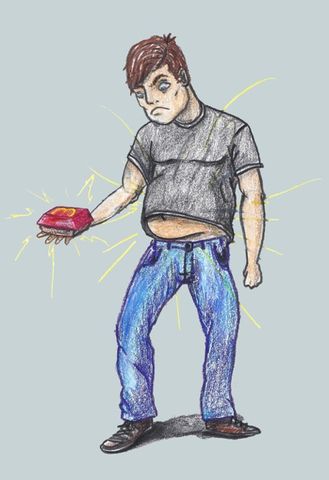In an evolution class last year, we collectively made Lamarck a recurring joke. Lamarck, the biologist preceding Darwin in the progression of evolutionary thought, theorized that animals evolve in correlation to their environments during their lifetimes. The example being that a giraffe, needing to reach the high leaves of a tree, can stretch its neck and over a matter of years become taller. Its offspring inherit this trait by the theory of inheritance of what Lamarck called “acquired characteristics.” Essentially, he thought that through use, heritable characteristics develop and, through disuse, they atrophy (insert “use it or lose it” joke here). Post-Darwinian evolution, this idea seems antiquated, even simple-minded. Yet recent research gives credibility to the notion that our actions may, in fact, affect our genetic influence on our children and grandchildren. This in mind, I broadly recommend you watch what you eat.
It’s perhaps a scary thought to consider that not only are your potential children affected by your genetic history but also by your day-to-day actions. Essentially, this far-reaching and complicated theory is the purview of current research being done in the field of epigenetics — basically, the study of how genes are affected by environmental factors (and subsequently passed on). This area of study exists in contrast to common knowledge developed in the years preceding the mapping of the human genome. The documentary Ghost in Your Genes first acknowledges, “Conventional biology has always believed that our genetic inheritance is set in stone at the moment of our conception.” Rather, as the documentary later evidences, this is not the case. Similar to Lamarck’s early theories, acquired characteristics seem to be as variable (and as valid and hereditary) as the sex of the parent passing on the gene, and the parent’s eating habits or stress levels. In epigenetic research, there’s an interest in how and what genes are “switched off” by contact with environmental factors (this is, coincidentally, not dissimilar to the work Mario Capecchi does with “knockout mice” in his lab at the U School of Medicine). It appears that these environmental factors may even include your diet.
In a study done using generations of mice, scientists discovered that the diet prescribed to each mouse had lasting effects on their progeny. More specifically, the “microbiome” — the microbial community developed by what the mice ate in life — was, according to one article, “passed on from parent to offspring, and worsened over time.” The experiments dealt primarily in low-fiber/high-fiber diet plans. The mice fed low-fiber diets lost bacteria that otherwise remained in the microbiomes of the control group. The low-fiber microbiome — devoid of certain bacteria — was then, remarkably, passed on to the next generation of mice. This finding suggests that, at least in mice — though there is evidence that a similar phenomenon has occurred in humans over the last 100 years following the development of highly processed low-fiber foods — diet can severely limit (or maintain) the microbiome of the participant’s offspring.
Though the research is not definitive, lower diversity in human microbiomes (caused by the same mal-nutritional eating habits imposed on the mice) can increase risk or severity of allergies, asthma and obesity. As Erica Sonnenburg, a microbiome researcher at Stanford, said, “We need to really think about the dietary decisions that a generation makes, because those dietary decisions can dramatically influence the microbiome that we then pass on to our offspring.”
In a nutshell, with much of the scientific jargon stripped away, this pitch is aimed at making you aware of a certain responsibility you might not have known you have. Your diet and your actions, whether you choose to smoke, exercise, eat loads of saturated fats or vegetate, can affect your children in harmful or helpful ways. Whether through epigenetic findings or microbiome heritability, your habits can affect your children’s risk for diseases, metabolic problems and genetic abnormalities. It turns out, barring research antithetical to these latest findings, Lamarck was not entirely wrong after all. I suppose the quip from our childhoods can be reworded: you are what your parents ate.


